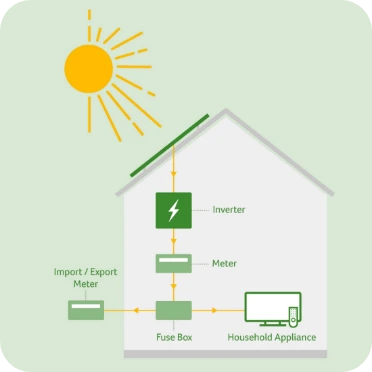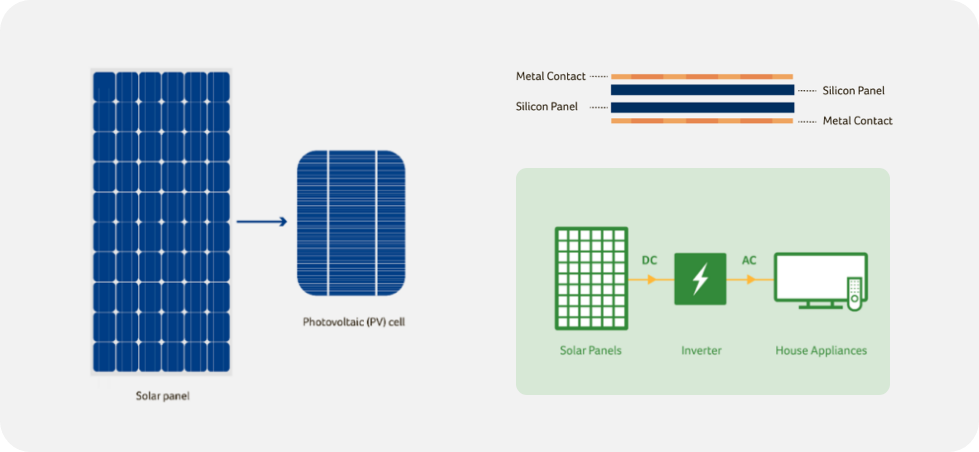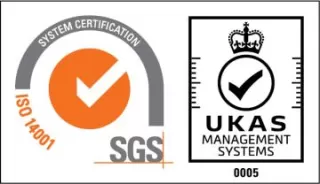Solar panels

How do solar panels work?
Inside each PV cell are two thin layers of silicon sandwiched between two metal contacts.
When sunlight hits the top layer of silicon, its electrons are ‘excited’ into flowing down towards the bottom layer as a direct current (DC). With the help of the metal contacts, this movement becomes an electrical circuit.
But this isn’t enough to power a home. Household appliances can’t use this type of electricity and so it needs to be converted into a different kind of current. Here’s where the inverter comes in.
What the inverter does
An inverter converts the direct current (DC) produced by your solar panels into the alternating current (AC) that your electrical appliances need to work. It’s probably the most important part of the whole system.
A small unit installed inside your home, the inverter takes the DC and runs it through a transformer so it essentially becomes the typical household 230-volt AC. From there, the current runs through the fuse box and meter to your appliances.
Any electricity you don’t use can be fed back into the national grid.

Do solar panels work at night/in the dark
Strictly no—solar panels are not too effective at night. But it’s now easier than ever to store energy your panels produce during the day. Batteries are the most popular method for doing this, and they are becoming more accessible and affordable as they continue to fall in price each year.
Do solar panels work in winter?
Yes. Because solar panels convert the sun’s light energy (its “solar irradiance”) and not its heat into electricity, winter daylight is plenty for the panels to power your home.
Do solar panels work under snow?
While snowy, wintry weather can actually improve a solar panel’s output—the white snow can reflect sunlight onto the panels, and coldness is better for panels than strong heat—if the panels are covered with snow, they won’t work at all.
Solar panels are often set at an angle, so much of the snow may fall off. But if not, you’ll need to find some way of clearing the snow from your panels, or face them being far less productive.
Do solar panels work in the shade?
They do, but not as well. Your roof should be free from shadows and obstacles (e.g. trees), as anything blocking the sunlight will make your solar panels less efficient.
How do solar panels work off-grid?
Off-grid means disconnected from the national grid. This means off-grid solar panels need battery storage to operate.
An off-grid system must:
• generate enough electricity all year round
• have enough battery capacity to meet the needs of the household
As these systems are expensive to maintain due to the expense of batteries, inverters and back-up generators, they are typically only found in remote areas where connecting to the electricity grid isn’t possible.
Are solar panels efficient?
Conditions for solar panels are never perfect, and so they are never 100% efficient. In fact, most residential panels have an efficiency of around 20%.
As the solar technology industry continues to advance, we can expect more efficiency from residential solar systems in the future.
Do solar panels work on flat roofs?
While most solar panels are tilted, solar panels can work just as well on flat roofs, as they use special mounting frames that allow them to be tilted at the best possible angle. There are added benefits, in that flat roofs:
• are easier to access, making installing and maintaining panels much easier
• do not need tiles taken up
• make the panels less visible from the street
What Affects Solar Panel Output?
The amount of energy your solar panels generate depends on several factors:
• Size of the system – A typical domestic system is around 3.5kWp and can produce roughly 3,000kWh per year.
• Roof orientation and angle – South-facing roofs with a tilt of 30–40° are ideal.
• Shading – Trees, chimneys, or nearby buildings can reduce output.
• Location – Homes in sunnier regions of the UK will generate more electricity.
How do solar panels work with batteries?
With solar panels, you use the electricity as it’s generated. However, solar batteries are now available which store the power your panels have produced during the day so you can use it later. This helps you maximise self-consumption and reduce reliance on the grid.
There are different types of solar batteries, all with different features and capabilities. Some are about the size of a car battery, while others can be as large as a generator or a washing machine.
If you generate more electricity than you use, you can export the surplus back to the grid through the Smart Export Guarantee (SEG). SEG has replaced the Feed-in Tariff (FIT) and allows you to earn payments from energy suppliers for exported electricity.
Most people who have solar panels installed go without a battery as they’re happy to revert back to the power from the national grid when their panels aren’t generating electricity themselves. It’s usually people who are determined to live ‘off-grid’ who decide to use solar batteries.
How Do I Check That My Solar Panels Are Working Efficiently?
Most solar panel systems come with a monitoring solution. This may be:
• A control panel installed in your home
• An app-based system that lets you track performance from your phone or tablet
These tools help you monitor how much electricity your panels are generating and identify any issues with performance.






